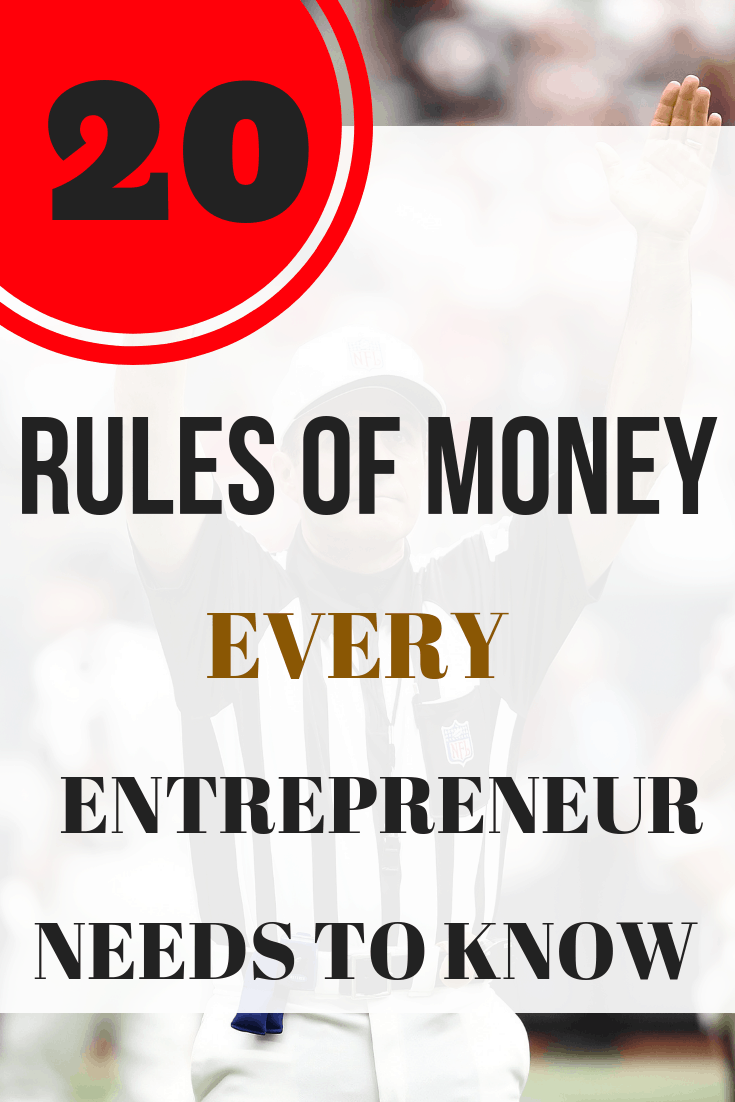I am experimenting with video series from YouTube. This first episode is about 20 rules of money. These are not your typical rules of money like the 50/30/20 rule, and the 80, 20 rule.
These are actual rules that I believe if you follow most of them, you will see an improvement with your mindset and this will translate into a better financial life.
First, Take a few seconds and read our affiliate disclosure
The YouTube channel is Valuetainment. This particular guy is very entertaining, energetic and gets the message across efficiently. His name is Patrick.
If you want to win at the game of entrepreneurship, you have to know these 20 rules of money. Here’s how to play to win the money game.
Below is the breakdown of what he discussed about. You can skip to the time that sounds exciting to you. Because everyone should adopt any information to apply to their scenario, I do not agree 100% with what he said. I also add my take and what I think about each one of them.
Rule of money #1: It’s a Game – 1:03

You are not allowed to break the rules
Here is the good news, the game can be learned. This rule, I feel is very solid, you have to stay in the game to win it. Keep hustling and keep trying different strategies to become rich.
This is what he believes is the most important and fundamental rule of money.
Money is a game. Like any game, you should play to win. Just like any game, the more you play, the better you become. In fact, there are books written about this concept. One that I enjoyed is below. Grab your copy on Amazon through this link.
Money: Master the game by Tony Robbins.
Rule of Money #2: Don’t Be a Hater of Money – 1:51
I am a Christian and I am very much aware of “the love of money is the root of all evil” verse. All I am going to say is that money does lots of goods in the world too. One that comes to mind is charity and even to build that church, you need money. What am I trying to say? Stop being negative about money. Stop hating rich people.
He also touched base on the subtle negative connotations about money. For example, here is a common saying which can be used to teach a lesson or be negative about money.
Money don’t grow on trees
Rule of money #3: It’s a Doubles Game – 2:43
There is a reason why one of the best ways to scam people is to tell them you can double their money. Subconsciously, we know this to be true – Money is a double’s game.
In the compound interest calculation, the calculation usually centers on how long it will take to double your money. Even the rule of 72 focus on this. No better explanation than how the Patrick explained it. According to him, you need to know your risk tolerance and the time horizon you are working with. If you are younger, you can afford to take more risk in general.
You can check out the link below to learn about doubling your money
Time value of money, why you should invest now and not later.
Rule of 72 calculator – how long will it take for your money to double
Rule of money #4: You have to seduce money, don’t let money seduce you – 4:37
The richest man in Babylon also touched base on this concept, that money has to be seduced.
The Law of Attraction is described as a universal force that responds to your energetic “signal” – which is a mixture of your dominant thoughts, emotions, and beliefs.
So, if most of your thoughts are “positive” you will get back mostly positive experiences.
If most of your thoughts are “negative” you will get back mostly negative experiences.
This article here discusses how to attract money by focusing on abundance mindset rather than lack and scarcity.
The analogy about an attractive girl is a little bit forced but gets the message across.
Don’t be desperate about money, this is how you lose money.

Pin me to Pinterest. Don’t leave me here
Rule of money #5: Be good with timing – 5:45
This is not to be mistaken for timing the market. We already established in a prior post that you cannot time the market.
The point here was difficult to understand, however here is what I got from this section.
Know when to spend versus when to cut expenses down. Both in personal life and in business.
Rule of money #6: Don’t let money get bored- 6:56
Always use your money. Don’t just keep your money in the checking account depreciating over time. Move it to where it can work for you. We touched base on how money is supposed to be a slave working for you in this epic post, the richest man in Babylon.
This is not to be confused with the emergency fund which we will discuss next.
Rule of money #7: Have a crisis account – 7:36
I cannot endorse a secret crisis account unless you want me to get in trouble with Mrs. Breathe Easy. So I have modified this to mean emergency fund. In actuality, that was what he was talking about anyways. When your back is against the wall, emergency/crisis fund comes in to save you. This is an essential part of the 12 toddler steps to financial freedom.
He does mention that you should have an account that no one knows about including your spouse. Let me know in the comment what you think about it.
Rule of money#8: Don’t Fly First Class – 8:39
This one should go without saying if you have been following my post or any of the personal finance blogger sites. The key to wealth is to never spend more than necessary at any given time. If the billionaires don’t fly first class, what would be my excuse to fly first class? You can let other people pay for your first class, but don’t pay for one. Instead, put that money into your business and expand your business.
There are calculations out there that proved that it is cheaper to have a private jet than to fly first class.
Rule of money #9: Study how you get taxed- 9:46
This one is divided into two sections. First is to decide if the country that you are in, favors your financial plan. Obviously, if you can leave the country, it is better to move to a country that fits your financial climate. If you are an entrepreneur, chances are that you want to be in a capitalist system. Find a place that has tax benefits that favor you.
The second part applies to most of us. We are not going anywhere. So the choice left is to figure out a way to make the system work better for you.
This one, in particular, applies well to our political climate in the USA. If the tax structure favors starting a business, then start a business. Add value somehow.
Rule of money #10: End of the World Mentality – 11:09
Suse Orman and Dave Ramsey got a mention here. Basically, all the financial gurus get paid to sell crisis.
Points here
- Do not think the end of the world is coming in terms of investment. Otherwise, you will make the wrong decision. You will rush to buy an investment or rush to sell investments if you have the end of the world mentality. The other end of this, are people always saying, “tomorrow is not guaranteed, so why invest for tomorrow”.
- When there is a crisis, a lot of people become wealthy. This is an opportunity to buy everything on sale. House is on sale, stocks are on sale, even labor is on sale as many people will be laid off work.
- Have a strategy for a down/bear market. Check out that article on the exact step you should take to survive the bear market. It is not a matter of if it will happen, it is only a matter of when.

Please Pin me.
Rule of money #11: Study Your Politicians – 13:22
Study your politicians especially your president. Know their philosophy. Are they raising taxes or cutting taxes. For example, if the tax is being cut for businesses, then start a business. Instead of swimming against the current, I tend to flow with the current in terms of politics and finance. Time to skip to the next point before this gets overtly political.
Rule of money #12: Study Smart Investors – 13:57
You need to pick a virtual mentor. While I don’t agree with everything Warren Buffet says, he remains my most respected virtual mentor.
Understand how rich people think. This is essentially the reason I read lots of books. Many actually believe that wealth is a mindset. And you can always pick out who is going to be wealthy based on their way of thinking. Read up. I always aim to read two books a month or at worst one book a month. Never stop learning from people smarter than you.
Have a mind of your own though and don’t be too religious about them. They are at a different stage of life and they could get away with some things that you can’t get away with.
Rule of money #13: Play Your Game – 14:34
Do not compare your game with others. Or at least if you are going to compare, let it inspire you instead of getting pressured.
Play your own doubles game. If you play at someone else’s speed, you will make a reckless mistake that could cost you. Have your own goal and plan. We have all heard of having a good investment policy statement. It is important to stick to it. Anytime I digress from my investor policy statement, I almost always regret it. You can write a different statement and modify it to your stage in life, but don’t just wing this and be careful about playing other people’s game.
I have also learned to back down when I discuss with people about finance. Not everyone has the “how high can you go” wealth mindset like me. So when they tell me they only want to be comfortable, I work with them. Before learning this fact, many hours have been wasted trying to convince people to be Ultra wealthy.
Rule of money #14: Don’t focus on beating the Index – 15:47
This is not to say you cannot try to beat the index. In fact, most of my investment right now is in low-cost passive index. However, don’t let this be your overall investment strategy. Like repeating this statement all day .. Must… beat… the .. index.
It is more important to beat your goal than just beating the index. For me, this is the reason I am trying to venture into real estate and entrepreneurship because of the challenge and a chance to do something different and diversify.
Sometimes the index is too slow for your time horizon. Running a business is a chance to beat the index.
Rule of money #15: Befriend Money Makers – 16:32
This is close to point #12. What is better than a virtual mentor? A real-life mentor or friend you can actually hang out with. Don’t be shy to invite people for coffee to pick their brain. When I was a resident, I once met an EKG technician at my hospital who was very unassuming. One day, we somehow started talking about retirement and investment. Don’t ask me how, but somehow I always touch on finance topic with everyone I meet. It can be annoying but I can’t help myself.
Back to the story, when we talked more, it turns out, she used to be a real estate agent who has made it big and has enough to retire according to her. She picked a job in the hospital as a way to stay active and also give back. I learned a lot of concepts from her over the years.
Rule of money #16: Diversification is for Sissies – 17:40
Ok, this one is going to strike a cord. This is not the first time I read about this though.
Here is what Mark Cuban has to say
Here is what my virtual mentor Warren Buffet has to say
There is two school of thought. Concentrate your forces versus spread your army to cover more ground. It is good to know there are many roads to Dublin.
My own take on this matter: I don’t know as much as the gurus. So I diversify. Also, while I am a little bit riskier than most, I am not the risk it all type of guy. When I play poker, I don’t go all in, on a bluff.
The approach you take also depends on what stage you are in life. If you are close to retirement, it makes no sense to take unnecessary risk. However, if you have 40 years horizon, you can live on the edge a little. With 90% stock, I already feel like I am living on the edge.
Rule of money #17: Leverage to expand your business – 19:01
Leverage here is not what I thought. My concept of leverage has always been to use debt to accelerate your financial journey while taking more risk. The Robert Kiyosaki style.
Here though, the focus is to find a way to leverage your way to grow your business, market, expand and increase the value of your business. To be honest, this rule fell flat somehow.
Rule of money #18: Position yourself properly – 19:41
Positioning is important in life. To utilize an opportunity, you have to be in the right position to take advantage. If you are a forward thinker, there is a chance that an opportunity will fall into place.
Rule of money #19: Make strategic Partnerships – 20:35
Make partnership, you cannot be an island. When you make money, make sure other people make money too. The more people make money when they deal with you, the more they will do business with you. Also, word spreads quickly, both positively and negatively in the business world. Especially in the age of social media. The 7 habits of highly effective people talked about always thinking win-win and also to synergize. That book is top 10 financial books everyone must read. Actually, how to be successful in everything period.
The famous example:
If you plant two plants close together, their roots will co-mingle and improve the quality of the soil, so that both plants will grow better than they would on their own.
An even more familiar example:
In blogging, when you write a blog post for someone or they write one for you, you both promote the article and get double the traffic.
Rule of money #20: Big Check Syndrome – 21:16
Don’t just hustle for that big break and then start forgetting the little things that actually make your business successful.
Also, if you catch a big break, say you made $100,000 in a day in your business, don’t start spending like you make 100k every single day.
Please let me know if this was helpful. Please comment and share. Join our team, we will send you every new post straight to your inbox. Thank you.
I am a pulmonary and critical care doctor by day and personal finance blogger/debt slaying ninja by night.
After paying off close to $300,000 in student loan debt in less than 6 months into my real job, I started on a mission to help others achieve the same. There is no magic to this than to strap up and get it done. Some of the ways we achieved this include side hustle, budgeting, great negotiation skills, and geographical arbitrage.
When I was growing up, common knowledge in Nigeria is that there is one thing you cannot trust anyone else with, and you guessed it – your money.
Being frugal came easily to me based on my background. However, the concept of building wealth did not solidify in my mind until when I finished medical school. I wish I knew what I know now when I was 14. Still, I don’t know enough and I am constantly learning to improve my knowledge.
My goal is to reduce financial illiteracy among young professionals. I am catering to the beginners – babies and toddlers in financial literacy.








xrayvsn says
Really nice set of rules DBEF on utilizing money/finance to improve your life. I am also in the diversify group because although I try to be informed, there is no way I can be an expert on something to put the majority of my money into a single entity. I also feel that when you have “won the game,” you don’t have to take as much risk and should diversify to protect your wealth rather than seek ways to add more to it even more (which can be riskier).
Thanks for referring to my Investment Policy Statement post as well. Appreciate it.
admin says
Thanks for stopping by. I agree with diversification. Also, the advocates of no diversification themselves are involved with multiple businesses. My adaptation to that would be to maybe master one particular field of business before jumping to another one. For example, in real estate, i have heard its better to focus on one particular type. Almost like the Niche down concept of blogging.
Young and the Invested says
Some useful tips on how to take the fear out of money. I thought your tip #11 about Suze Orman and Dave Ramsey putting fear and crisis as the motivation for their followers to heed their advice is accurate. I hope by blogging I can help to remove the fear of money from people’s minds. Operating out of fear isn’t a great way to make decisions about your money.
Thanks for sharing!
admin says
Yup, the doom day scenario sells well. What if the market crashes? what if the dollar plummet? what if there is a nuclear war? Blogging is definitely an awesome avenue to learn a lot and also share that knowledge. Thanks for stopping by. I appreciate it.
ImmigrantFinances says
Honestly I think Dave Ramsey get unnecessary bad rap sometimes. You can accuse him of some things but creating fear and crisis as motivation for his listeners is not really one of them. I think he has done much more good than people care to give him credit for. Yeah, his investing advice could be a lot better but it’s not that terrible.
Great post btw. Of course I don’t agree with a few of them, but the others are quite solid!
admin says
We are not taking away from their achievements. Even Suse Orman sometimes she makes sense. The best thing about personal finance is that it is personal, we mix and match here and there and then come up with the best formula for us. I am not as debt averse for example and I could use a bit of leverage when needed.
Thanks for stopping by as always.
Layna says
I like Rules 3, 6, and 14! I agree with them and more people really need to know what to do with their money rather than letting it sit in the bank!
Thanks for sharing 🙂
Layna
http://www.beautybeyondtwenty.com
admin says
Thanks for stopping by. The rules apply for most part. I could not resist sharing it. Letting money sit in the bank is like the worst way to use money. Inflation will kill it very quickly.
Batmom85 says
Great tips, I’m learning more and more about using my finances smarter as an entrepreneur. These tips are definitely helpful. Great work. You’re always creating such great financial content. Truly remarkable content.
mnealewriting says
I have come across all of these rules in one way or another and I can totally agree with what you are saying. Investment and entrepreneurship is something I am looking to move into and it’s always good to have lots of different information sources. Great post!
morgiereacts says
This is so useful and interesting!
admin says
Thanks for stopping by. I am glad you found the content useful.
phillyfreeze69 says
Having a crisis or emergency fund is paramount for a good night sleep!…20 useful tips for anyone desiring to get their personal finances in order.
admin says
Right on point. I am starting to feel like I talk about emergency funds too much. It is such a key element to wealth building. Thanks for stopping by.
Baby Boomer Super Saver says
You may feel like you’re talking about emergency funds too much, but the truth is, most people don’t have one! Being able to set aside even $100, $500, $1,000 and eventually 3-6 months of living expenses will make it easier to deal with the things that come up unexpectedly – and they always do!
While I think it’s good to know how taxes affect your income, wealth, business, etc., I think it’s also important to know what your investment expenses are. Maybe there is a need for another rule – make sure your investment fees are as low as possible!
admin says
Thanks for stopping by. Emergency fund is soo important and i am glad you agree. You are more than right on the investment fee. Keeping the fee down is the main way to get ahead, and the reason why the low cost index funds outperform the active managers. Warren Buffet even placed a 1 million dollar bet on it. Big company stock funds underperformed indexes nearly 93% of the time for a 15-year period https://www.forbes.com/sites/johnwasik/2018/01/08/how-buffett-won-his-1-million-bet/#7bf9007c2a6c
Law Of Attraction Exercises says
Very revealing bless you, I do think your current audience might want a whole lot more content such as this continue the excellent work.